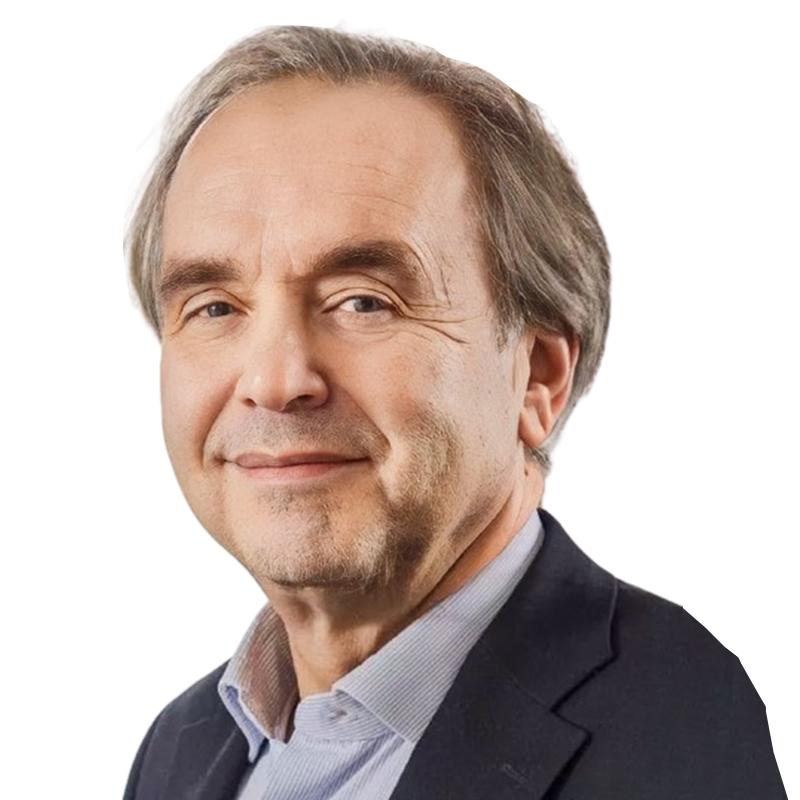Prof. Dr. Klaus Mainzer

President of the European Academy of Sciences and Arts in Salzburg, German philosopher and scientist
Bio
As a philosopher of science, Professor Mainzer studies the foundations and future perspectives of science and technology. He focuses on the mathematical treatment and computer modeling of science and technology. He is known as a researcher of complexity with a focus on complex systems in the natural world, technology, business and society and the paradigms of artificial intelligence and big data. Using constructive and algorithmic mathematical processes, the topic of his doctoral dissertation, he used his postdoctoral lecture qualification to study their applications in geometry and physics. This work formed the basis for his first books on the foundations and history of geometry and numbers between 1980 and 1990 (with H. Hermes, F. Hirzebruch, R. Remmert et al.), of symmetry and time, the theory of relativity, quantum mechanics and cosmology (with J. Audretsch). Computer-based modelling of complex systems and their non-linear dynamics have been his focus since the early 1990s. He has published numerous works on complex systems (with H. Haken), cellular automata and neuronal networks (with L. Chua). The question of the predictability and computability of the world has been at the heart of Klaus Mainzer’s research since his dissertation. We live in a data-driven age of growing complexity, the development of which is accelerated by the exponential laws of growth of data volumes and computer and storage capacities in global networks. His research therefore aims at finding constructive mathematical problem-solving methods and evidentiary processes (with H. Schwichtenberg et al.) that can be used to ensure the algorithmization and digitization of technology and society remain manageable. He has further dedicated himself to this societal goal in numerous publications, public presentations and media appearances.
| 1966 - 1968 | Abitur and German Federal Armed Forces service |
| 1968 - 1972 |
Studies in Mathematics, Physics and Philosophy the University of Münster (with a |
| 1973 |
Doctorate on the Philosophy and Principles of Mathematics (advisors: Friedrich Kaulbach, |
| 1973 - 1979 | Assistant in the Department of Philosophy at the University of Münster |
| 1979 | Habilitation (Postdoctoral lecture qualification), entitled “Space, Geometry, and Continuum” ("Raum, Geometrie und Continuum") |
| 1980 | Heisenberg Fellowship |
| 1981 - 1988 | Professor of Theoretical Foundations and History of the Exact Sciences, Dean and Prorector at the University of Konstanz |
| 1988 - 2007 | Professor of Philosophy and Philosophy of Science, Director of the Institute for Philosophy, Dean of the Department of Philosophy, Founding Director of the Institute for Interdisciplinary Informatics at the University of Augsburg |
| 2008 - 2016 | Professor of Philosophy and Philosophy of Science, Direct of the Carl von Linde Academy, Founding Direct of the Munich Center for Technology in Society (MCTS) at TUM |
Memberships and honors
The Academy of Europe (Academia Europaea)/London
European Academy of Sciences and Arts/Salzburg
German National Academy of Science and Engineering (acatech)
President of the German-Japanese Society of Intergrative Science
Foundation Board of the Udo Keller Stiftung (Hamburg)
You can download "Explanations of honors and awards"
Research stays/guest professorships (selected)
University of Campinas (Brazil), Center for Logic and Philosophy of Science 1983
University of Pittsburgh (USA), Center for Philosophy of Science 1984
Tsinghua University (Beijing), Center for Science, Technology and Society 1997
University of California, Berkeley (USA), Faculty of Electrical Engineering and Computer Science 2003
University of Tokyo (Japan), Faculties of Philosophy, Mathematics, Economics 2016
University of Seoul (South Korea), Biointelligence Lab 2016
Research projects (selected)
German Research Foundation (DFG): Selbstorganisation und komplexe Systeme (1992-1994)
Fritz Thyssen Foundation: Komplexe Systeme und nichtlineare Dynamik in Natur und Gesellschaft (1998-1999)
Academia Europaea: Basic Concepts of Science: Symmetry, Causality, Law (2009-2013)
German Research Foundation (DFG): Philosophy Meets Robotics (2011)
NSF (USA): Neuromorphic Architecture of Computing (2012-2014)
Udo Keller Stiftung: Proofs-Computation-Digitalization in Mathematics, Informatics, and Philosophy (2016-2019)
Key publications
K. Mainzer (with H. Hermes, F. Hirzebruch, R. Remmert et al.), Numbers: Readings in Mathematics, Springer, 1991 (translated into French, Japanese; original in German)
K. Mainzer, Symmetries of Nature, De Gruyter: Berlin/New York 1996 (original in German)
K. Mainzer, Thinking in Complexity, Springer: New York 5th edition. 2007 (translated into Chinese, Japanese, Polish, Russian)
K. Mainzer (with L. Chua), The Universe as Automaton, Springer: Berlin 2011
K. Mainzer, Die Berechnung der Welt. Von der Weltformel zu Big Data, C.H. Beck: Munich 2014

